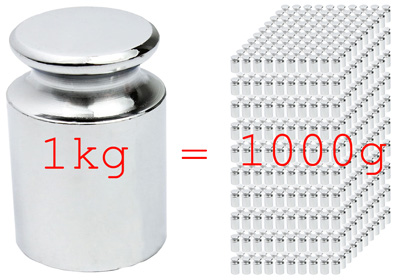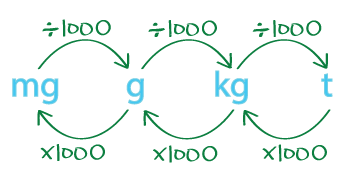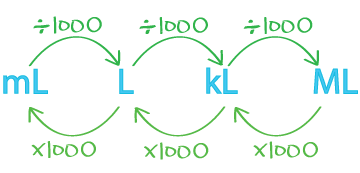Units Of Measurement Conversion
Converting Units Of Measurement
We are sometimes presented with units of measurement that are not in the best format. For example we may have 1,100g of something but it is much more effective to say 1.1kg. Of course 1,100g and 1.1kg are exactly the same they are just in a different format.
So how to we convert one to the other? To achieve this we will use the operations of multiply or divide.
The basic principle is that when we are going from say kg to g we are going from a small number of kg to many g. To turn a small number to a big number you multiply. When we go the other way from g to kg we divide.
How To Convert Units Of Measurement

You can see from the image above that 1kg is 1000g. So compared to the number of kilograms an object weighs it weighs many more grams. So to go from 1kg to 1000g we multiply the number of kg by 1000. If I have 2kg I will have lots of g and 2kg x 1000 = 2000g. Going the other way is the opposite. Lots of g makes only a small number of kg. So to turn g into kg we divide. 7000g ÷ 1000 = 7kg.
Converting Distance Units

Distance units are the hardest to convert as you have to remember to use 10, 100 and 1000 at the right time.
You can see from the image above to go from mm to cm you divide by 10. To go from cm to m you divide by 100. To go from m to km you divide by 1000. To go the other way you use multiply. To go from km to m you multiply by 1000. To go from m to cm you multiply by 100 and to go from cm to mm you multiply by 10.
Converting Weight/Mass Units

Mass/weight units are easier to convert as you only have to remember to use 1000.
You can see from the image above to go from mg to g you divide by 1000. To go from g to kg you divide by 1000. To go from kg to t you divide by 1000. To go the other way you use multiply. To go from t to kg you multiply by 1000. To go from kg to g you multiply by 1000 and to go from g to mg you multiply by 1000.
Converting Volume/Capacity Of A Liquid Units

Volume/capacity of a liquid units are easier to convert as you only have to remember to use 1000.
You can see from the image above to go from mL to L you divide by 1000. To go from L to kL you divide by 1000. To go from kL to ML you divide by 1000. To go the other way you use multiply. To go from ML to kL you multiply by 1000. To go from kL to L you multiply by 1000 and to go from L to mL you multiply by 1000.
Units Of Measurement Conversion Chart
| Measurement Units Conversion Table | |
| Metre British Spelling - Meter US Spelling Litre British Spelling - Liter US Spelling | |
| Unit | Conversion |
| Distance | |
| Millimetres mm | 10mm = 1cm |
| Centimetres cm | 100cm = 1m |
| Metres m | 1000m = 1km |
| Kilometres km | 1000m = 1km |
| Weight/Mass | |
| Millgrams mg | 1000mg = 1g |
| Grams g | 1000g = 1kg |
| Kilograms kg | 1000kg = 1t |
| Tonnes t | 1000kg = 1t |
| Volume Of A Liquid | |
| Millilitres mL | 1000mL = 1L |
| Litres L | 1000L = 1kL |
| Kilolitres kL | 1000L = 1kL |
| Megalitres ML | 1000kL = 1ML |
| Gigalitres GL | 1000ML = 1GL |
| Cubic Millimetres mm3 | 1000mm3 = 1cm3 |
| Cubic Centimetres cm3 or CC | 1,000,000 cm3 = 1m3 |
| Cubic Metres m3 | 1,000,000,000m3 = 1km3 |
| Cubic Kilometres km3 | 1,000,000,000m3 = 1km3 |
| Volume Of A Solid | |
| Cubic Millimetres mm3 | 1000mm3 = 1cm3 |
| Cubic Centimetres cm3 or CC | 1,000,000 cm3 = 1m3 |
| Cubic Metres m3 | 1,000,000,000m3 = 1km3 |
| Cubic Kilometres km3 | 1,000,000,000m3 = 1km3 |
| Area | |
| Square Millimetres mm2 | 100mm2 = 1cm2 |
| Square Centimetres cm2 | 10,000cm2 = 1m2 |
| Square Metres m2 | 1,000,000m2 = 1km2 |
| Square Kilometres km2 | 1,000,000m2 = 1km2 |
| Hectares ha | 10,000m2 = 1ha |
| Angles | |
| Degrees o | 360 Degrees o = 1 circle |
| Time | |
| Seconds s | 60 seconds = 1 minute |
| Minutes m | 60 minutes = 1 hour |
| Hours h | 24 hours = 1 day |
| Temperature | |
| Degrees Celcius oC | |
| Money | |
| Dollars $ | 100 cents = $1 |
| Cents | 100 cents = $1 |
- Home
- Mathematics
- Mental Maths
- Understanding 2
- Understanding 3
- Understanding 5
- Understanding 10
- Consolidate Stage 1
- Understanding 0
- Understanding 1
- Understanding 4
- Understanding 6
- Understanding 7
- Understanding 8
- Understanding 9
- Consolidate the Hard Mental Maths
- Consolidate Stage 1 and 2
- Understanding 11
- Understanding 12
- Operations 0 to 6
- Operations 0 to 12
- Operations 0 to 1000
- What is measurement?
- Mathematics Discussions
- Mathematics Role Plays
- Mathematics Pedagogy
- Mental Maths
- Sitemap
© 2025


